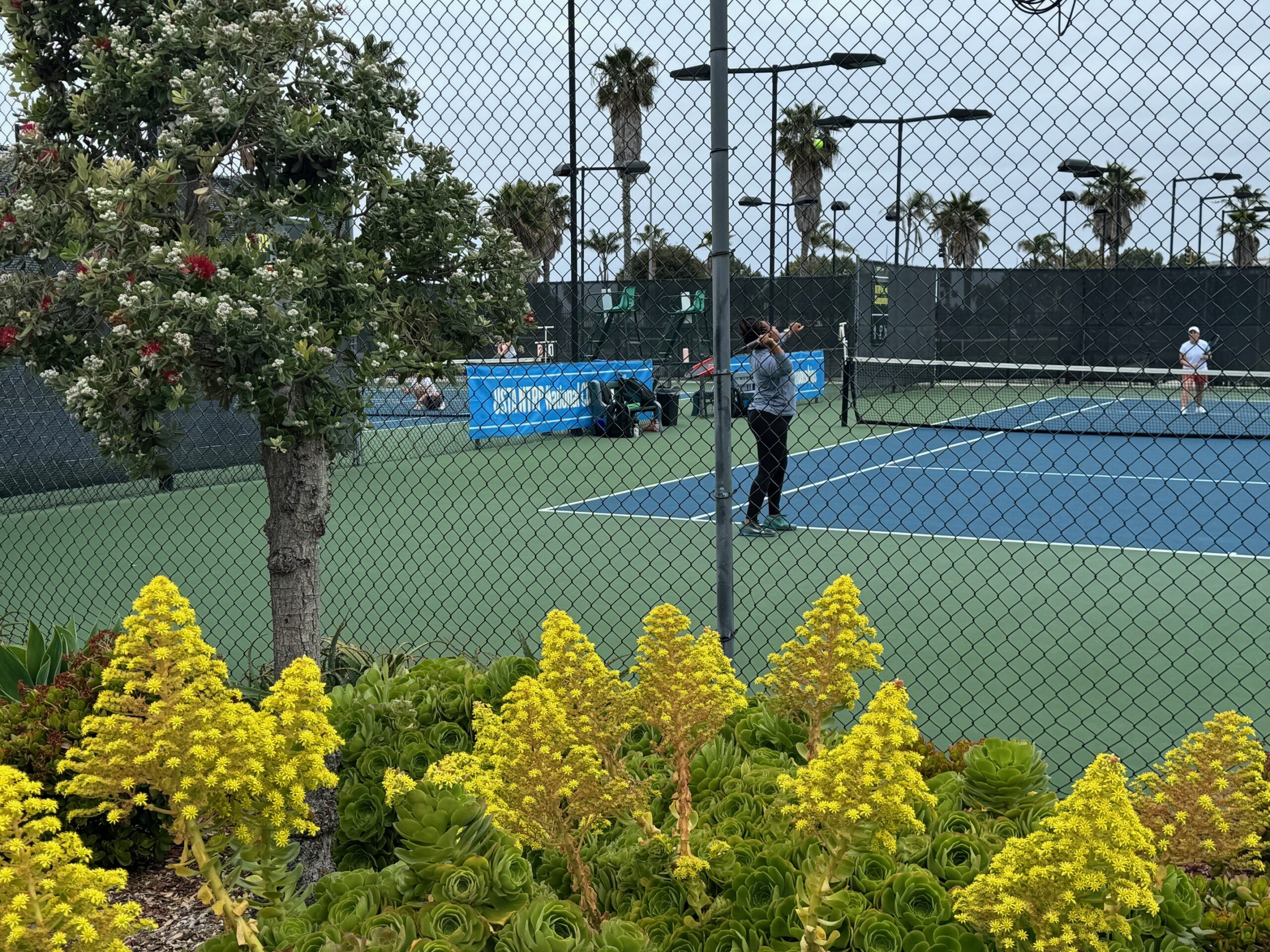For the past couple of weeks, we have been examining the rules surrounding retiring from tennis matches. Throughout that examination, I have been alluding to an incident that occurred earlier this year at the Tom Fey Tri-Level National Invitational Championships. Today is the day to finally trace through the actual events of that day, at least as I understand them.
This account comes with significant disclaimers. First and foremost, I was not a witness to anything that happened that day in San Diego. However, I have communicated with numerous people who were onsite that day who shared a wide variety of perspectives. While I feel relatively confident that I have the broad strokes correct in terms of what happened, some speculation is required to understand the why. I have tried to call out each instance of that.
The Tom Fey Tri-Level National Invitational Championships uses a format similar to the USTA League National Championships. Teams play four unflighted “round-robin” matches on the first two days. The top four teams advance to the championship stage on the third day with bracketed semifinals that advance to a Championship. The losing teams of the semi-finals square off to decide 3rd place.
An announcement was made about completing matches on the morning of the championship stage for the men’s “High” (5.0/4.5/4.0) Tri-Level division. The majority of the people I talked to who were onside that day did not hear that announcement. One of those people includes the captain of the players who were ultimately penalized. Some of the players on his team confirmed that they heard the announcement. However, they interpreted it as a recommendation rather than a mandate. I also found one player who was onsite, who heard the announcement, and who was uninvolved with the controversy. That person also interpreted the announcement as a request.
Unfortunately, subsequent events strongly suggest that the event administration viewed the announcement as a mandate. That speculation is the most plausible explanation of everything else that transpired.
The summary of the rules published for the Tom Fey Tri-Level National Invitational Championships does not explicitly prohibit players from retiring from matches. Additionally, there is nothing against doing that in any of the other rulebooks cited by the event. The announcement was the only communication of expectations to the competitors, and I failed to find anyone who heard it as a mandate.
The team from Texas won two of the three lines in their Semi-final match against Middle States. Since the team’s advancement to the Championship Finals was assured, one of the players on the 4.5 line that was still in progress retired from their match. The official reason given was a sore elbow. However, since that team only brought two 4.5 players to the event, it is easy to assume that the match was discontinued as a strategic move to conserve condition for the finals.
Sometime after the match was completed, the Texas captain was approached by the tournament director and was told they needed to talk to his players about why the match was discontinued. He was told that it was “serious.” Following a discussion with the two players from that match, the Championship Committee disqualified them from competing further in the event. For Tri-Level, the committee was comprised of the tournament director, an on-site member of the national staff, and a Referee.
Disqualification of any player can only come from misconduct. Even then, the misconduct has to be severe. My immediate reaction when I heard the story for the first time was that something else beyond a mere match retirement must have occurred. If that were the case, it wouldn’t be the first time I was regaled with a story from a tennis player that diverged from the facts. However, I was unable to find anyone who thought the two players from Texas did anything that would remotely be construed as misconduct.
There is widespread belief within the Texas team that the captain from Middle States instigated the grievance over the match retirement. He hung close as the subsequent events transpired and was quick to inject that the Texas team needed to be “punished.” No USTA official questioned the match retirement as it occurred, and nothing was said to the Texas captain until about 45 minutes after the match ended.
Disqualification is serious. It is even more severe for a team that only brought six players to the event. That means that under the initial ruling, they would have had to default one line in the Championships, but it is actually even worse than that. Per Tri-Level rules, only the lowest line can be defaulted. That means that the 4.0s would have to compete against the Missouri Valley team’s 4.5s in the Championship. Not coincidently, I am told that the Missouri Valley Captain was also hanging around and interjecting the need to “punish” the Texas team.
If a similar disqualification had occurred at a tennis tournament, the USTA Friend at Court requires that event to have an Appeals Committee that is independent of the Tournament Committee, who made the original judgment. USTA League Regulations has no such provision. Of course, USTA League Regulations also don’t define the concept of disqualification for misconduct either. However, I would agree that officials should be able to do that in extreme cases. Retiring from a match doesn’t meet that threshold for me. That is why I kept looking and failing to find something else that would have justified that outcome.
The Tri-Level Championship Committee seems to have done a pretty good job doubling up as the Appeals Committee, despite the potential for conflict of interest. This is to their credit. It is pure speculation on my part, but somewhere along the way, they may have realized that the original penalty was too harsh. The suspension points that were ultimately levied against the two Texas players were presented as an alternative. That was ultimately accepted, and 8 suspension points now appear on each of the records for the two players.
However, this story took one more bizarre detour before the final round. The Missouri Valley Captain that the Texas Team played for the Championship was unhappy with the suspension point resolution. It is easy to speculate that is because his team did not receive any advantage from the punishment in the Championship Finals.
After he complained to the Championship Committee, the captain of the Texas team was presented with one more alternative. He was told that if they arranged for his two players to show up late for the finals, they would start their match down 0-3 and that no suspension points would be levied. This is absurd on many levels. I do not believe that a gross misconduct infraction can potentially be expunged by doing something else wrong. That offer was refused by the Texas team.
Ultimately, Texas won the Championship, and two of their players each walked away with 8 suspension points. However, this leaves us with a separate rules trace of the USTA League suspension point system as well as numerous questions of sportsmanship. Tomorrow, we’ll take a closer look at the USTA League Suspension Point system.
- USTA Tri-Level National Invitational Welcome Page, USTA SoCal Hosted Informational Page, last viewed April 6, 2024.
- 2024 USTA League National Regulations, USTA Resource Document, March 14, 2024.
- Friend at Court: The Handbook of Tennis Rules and Regulations, USTA, 2024
- USTA Adult and Family Tournament, Ranking, & Sanctioning Regulations, USTA Regulation, as amended December 14, 2023.
- USTA League Suspension Point System Calculation Tables, USTA Resource Document, February 6, 2024.
- USTA League Suspension Point System 2024, USTA Resource Document, February 6, 2024.
- USTA League Suspension Point System Frequently Asked Questions, USTA Resource Document, March 23, 2023.



You might be right about being close to winning, but that’s just an excuse to me and doesn’t make it right. It probably is an issue, but I would say it’s not just an issue with USTA, but any rec sport.
They could be right that the Texas team was full of sandbaggers, and they were probably were once you get to the SF/F stage of most divisions, but so are the other teams at that stage too probably. But, the real issue there would be the USTA allowing this to continue to happen.
The officials encouraging everyone to complete all the matches is great, but as you pointed out in an earlier post that once the match is decided, the players on the winning team want to conserve energy and also ratings and would just throw in the towel and not use much energy nor try until the match was completed. So, this actually wouldn’t be a good thing necessarily. But, the officials making up rules on the spot is an entirely different issue, as well as overstepping their duties. Also, the USTA Nationals or whoever’s in charge needs to review the suspension points, but they maybe already did.
Thanks for sharing this story. I have several questions and thoughts, which you may or may not know.
1. Why were both Texas players given suspension points when only one of them wanted the retirement?
2. Why is Tri Nationals making up rules on the spot? You said not allowing retirements was never in the rules for this tournament or anywhere else? Even if they say it before the SFs as an announcement, it’s still not an actual rule. And sounds like most people thought it was a mere suggestion.
3. Why is an actual grievance needed for the tournament to look into it? They should already be looking into it if they’re going to. Also, how dumb by the Middle States captain. They have nothing to gain at that point, and just complaining to complain.
4. Sounds like the tournament is overstepping their duties giving suspension points.
5. What a weird option allowing the Texas 4.5s to come late and start down 0-3. And nowhere in the rules.
6. Are the Texas players appealing their suspension points? I think you need 10 in a 12-month span to actually be suspended. So if they don’t get anymore anytime soon, it’ll reset for them back to 0, so they should be fine.
7. Not surprising the Missouri Valley captain might do this. I know who he is, seems a like a good guy, but seems a bit ridiculous if he was pushing for penalties against Texas in the Final, but I’m not surprised. But I guess this still a little speculative. But, I’ve heard of some shady things happening at Missouri Valley mixed sectionals before, though I’m not 100% on anything. But, not necessarily anything he did, but relating to his teams.
Your questions anticipate some upcoming posts. There are a lot of rule nuances to break down on this, which is why it is taking me so much time at my “one page a day” rate.
I think that from a competitor standpoint, people get into a position to maybe win a “National Championship” and lose their minds. Rather than focusing on the behavior of any individual, I think that what happened speaks to a systemic issue with sportsmanship in USTA League format tennis. I suspect that if the other captains decided to respond, they might claim that the Texas team was all way “above level.” I have seen similar situations play out because the best team at the event was believed to be full of sandbagging jerks.
I also want to emphasize that I am not trying to be critical of the officials. I think that they are trying to thread the needle on giving all players the best experience while preserving equity in the competition. I genuinely think they decided that encouraging players to complete all matches was a good idea, and it just spun out of control.